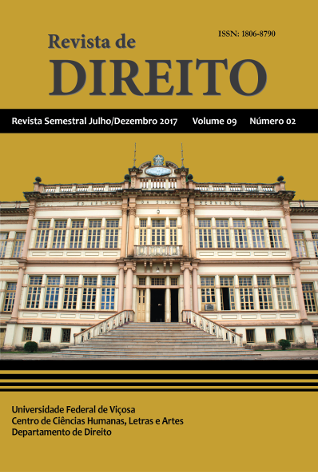THE NEED TO EFFECT THE VICTIM'S REPRESENTATION IN CRIMES OF DOMESTIC VIOLENCE AGAINST WOMEN IN THE LIGHT OF THE DIRECT ACTION OF UNCONSTITUTIONALITY 4.424 / DF.
Keywords:
Criminal Procedural Law. Human rights. Fundamental rights. Domestic and Family Violence against Women. Direct Action of Unconstitutionality 4, 424 / DF.Abstract
The purpose of this study is to discuss the need to carry out the criminal representation of the victim in cases of domestic and family violence against women, under the focus of the decision handed down by the Federal Supreme Court in the judgment of the Action direct of Unconstitutionality 4,424 / DF. It will be tried to demonstrate how old is the condition of submission of the woman, through a study of the societies throughout history, addressing its characteristics, in order to identify the inheritance left by these to the current society. The Law 11.340 / 06 (Maria da Penha) will be appreciated, highlighting the reasons for its creation, its objectives, social purposes and the modifications that it made in the national legal system upon coming into force. It will seek to understand what constitutes domestic and family violence against women, their forms of expression, the peculiarities present in such a situation, envisioning also the reasons that prevent many victims from denouncing their aggressors.Downloads
Download data is not yet available.
References
BRASIL. Constituição. Brasília: Senado Federal, 1988.
BRASIL. Lei 11.340/2006. Brasília: Senado Federal.
BRASIL. Superior Tribunal de Justiça. Habeas Corpus nº 91540/MS, rel. Min. Napoleão Nunes Maia Filho, decisão unânime, julgado em 19 fev. 2009.
BRASIL. Superior Tribunal de Justiça. Habeas Corpus nº 113608/MG, rel. Min. Og Fernandes, rel. para acórdão Min. Celso Limongi, decisão por maioria, julgado em 05 set. 2009.
CUNHA, Rogério Sanches; PINTO, Ronaldo Batista. Violência Doméstica: Lei Maria da Penha Comentada Artigo por Artigo. 4ª ed. rev. atual. amp. São Paulo: Revista dos Tribunais, 2012.
CABETTE, Eduardo Luiz Santos; SILVA, Larissa Ribeiro da. Lei Maria da Penha, violência, medo e amor: da denúncia ao perdão. Disponível em: jus.com.br/artigos/25829/lei-maria-da-penha-violencia-medo-e-amor. Acesso em: 20 fev. 2014.
DIAS, Maria Berenice. A Lei Maria da Penha Na Justiça: a efetividade da Lei 11.340/06 de combater à violência doméstica e familiar contra a mulher. 3ª ed. rev. atual. amp. São Paulo: Revista dos Tribunais, 2012.
FIGUEIRA, Divalte Garcia. História: série novo ensino médio. 2ª ed. São Paulo: Ática, 2005.
MELANI, Maria Raquel Apolinário. Projeto Araribá: História – 5ª Série. 1ª ed. São Paulo: Moderna, 2006.
MURARO, Rose Marie. A Mulher No Terceiro Milênio. Rio de Janeiro: Rosa dos Tempos, 1995.
SANTOS, Fabrício. Bruxas e o Poder Simbólico. Disponível em: www.brasilescola./historia/bruxas.html. Acesso em: 11 mar. 2014.
SOUSA, Rainer. Feminismo no Brasil. Disponível em: www.brasilescola.com/historiab/feminismo.html. Acesso em: 07 mar. 2014.
ORGANIZAÇÃO DOS ESTADOS AMERICANOS. Comissão Interamericana de Direitos Humanos. Relatório Anual 2000. Disponível em: www.sbdp.org.br/arquivos/material/299_Relatn.pdf. Acesso em: 18 mar. 2014.
SENADO FEDERAL. Violência Doméstica e Familiar Contra a Mulher. Brasília: DataSenado, 2013. Disponível em: http://www.senado.gov.br/noticias/datasenado/pdf/datasenado/DataSenado-Pesquisa-Violencia_Domestica_contra_a_Mulher_2013.pdf. Acesso em: 20 mar. 2014.
BRASIL. Lei 11.340/2006. Brasília: Senado Federal.
BRASIL. Superior Tribunal de Justiça. Habeas Corpus nº 91540/MS, rel. Min. Napoleão Nunes Maia Filho, decisão unânime, julgado em 19 fev. 2009.
BRASIL. Superior Tribunal de Justiça. Habeas Corpus nº 113608/MG, rel. Min. Og Fernandes, rel. para acórdão Min. Celso Limongi, decisão por maioria, julgado em 05 set. 2009.
CUNHA, Rogério Sanches; PINTO, Ronaldo Batista. Violência Doméstica: Lei Maria da Penha Comentada Artigo por Artigo. 4ª ed. rev. atual. amp. São Paulo: Revista dos Tribunais, 2012.
CABETTE, Eduardo Luiz Santos; SILVA, Larissa Ribeiro da. Lei Maria da Penha, violência, medo e amor: da denúncia ao perdão. Disponível em: jus.com.br/artigos/25829/lei-maria-da-penha-violencia-medo-e-amor. Acesso em: 20 fev. 2014.
DIAS, Maria Berenice. A Lei Maria da Penha Na Justiça: a efetividade da Lei 11.340/06 de combater à violência doméstica e familiar contra a mulher. 3ª ed. rev. atual. amp. São Paulo: Revista dos Tribunais, 2012.
FIGUEIRA, Divalte Garcia. História: série novo ensino médio. 2ª ed. São Paulo: Ática, 2005.
MELANI, Maria Raquel Apolinário. Projeto Araribá: História – 5ª Série. 1ª ed. São Paulo: Moderna, 2006.
MURARO, Rose Marie. A Mulher No Terceiro Milênio. Rio de Janeiro: Rosa dos Tempos, 1995.
SANTOS, Fabrício. Bruxas e o Poder Simbólico. Disponível em: www.brasilescola./historia/bruxas.html. Acesso em: 11 mar. 2014.
SOUSA, Rainer. Feminismo no Brasil. Disponível em: www.brasilescola.com/historiab/feminismo.html. Acesso em: 07 mar. 2014.
ORGANIZAÇÃO DOS ESTADOS AMERICANOS. Comissão Interamericana de Direitos Humanos. Relatório Anual 2000. Disponível em: www.sbdp.org.br/arquivos/material/299_Relatn.pdf. Acesso em: 18 mar. 2014.
SENADO FEDERAL. Violência Doméstica e Familiar Contra a Mulher. Brasília: DataSenado, 2013. Disponível em: http://www.senado.gov.br/noticias/datasenado/pdf/datasenado/DataSenado-Pesquisa-Violencia_Domestica_contra_a_Mulher_2013.pdf. Acesso em: 20 mar. 2014.
Downloads
Published
2018-03-15
How to Cite
BORITZA, O. R.; MAZZO, L. R. THE NEED TO EFFECT THE VICTIM’S REPRESENTATION IN CRIMES OF DOMESTIC VIOLENCE AGAINST WOMEN IN THE LIGHT OF THE DIRECT ACTION OF UNCONSTITUTIONALITY 4.424 / DF. Revista de Direito, [S. l.], v. 9, n. 02, p. 205–241, 2018. Disponível em: https://beta.periodicos.ufv.br/revistadir/article/view/1753. Acesso em: 21 nov. 2024.
Issue
Section
Articles
License
The published work is the entirely the responsibility of the authors, and Revista de Direito is only responsible for its evaluation, as a medium for scientific publication.
After publication, the authors cede the copyright, which becomes the property of Revista de Direito.
Revista de Direito is not responsible for any violations of Law No. 9,610/1998, the Brazilian Copyright Law.
In the identification of plagiarism and self-plagiarism, the manuscript will be rejected.















